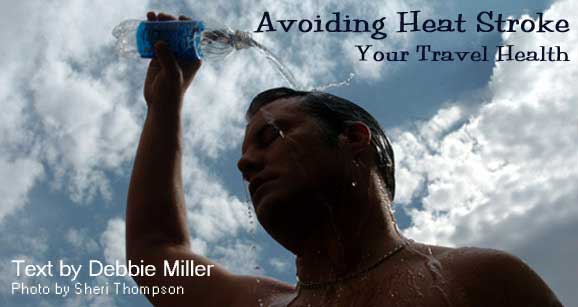

Every summer, people become ill while enjoying the outdoors. The culprit? Heat exhaustion and heat stroke.
Heat exhaustion and heat stroke can sneak up on you, even when you’re watching out for it. The body gains heat faster than it can be dissipated. Symptoms of heat exhaustion include headache, nausea, lightheadedness, weakness, fatigue, giddiness, irritability, increased heart rate and muscle cramps.
When the body temperature rises, dehydration and delirium can set in.
To avoid this dreadful malady, get out of the sun. Remove or loosen heavy clothing. Lie down and elevate the feet. Use tepid water and fanning to aid cool down. Ice packs can be applied to the neck, under the arm or to the groin. If you are not vomiting, drink a cup of cool water every 15 minutes. Emergency medical attention should be sought if you are not feeling better in a few minutes.
Heat exhaustion can turn to heat stroke, which can cause death. At this point, the ability to self-regulate body temperature is lost. Body temperature may then rise above 105 degrees Fahrenheit (41 degrees C).
Heavy alcohol consumption, diabetes and old age can increase the risk of heat stroke. The symptoms of heat stroke have a rapid onset, and can include sensitivity to light, nausea and vomiting, weakness, altered mental status, hallucinations, seizures, headache, rapid pulse and breathing rate. Skin is often red, hot and dry to touch, although there can be sweating. This can be followed by confusion, delirium and coma. Call emergency medical help immediately if you or someone you know is experiencing these symptoms.
While waiting for help to arrive, use the same treatments for heat exhaustion: Get out of the sun, give tepid water and apply ice packs.
To help prevent heat exhaustion and stroke, wear clothing that is breathable and loose. In warm weather, take frequent breaks in shaded areas to allow the body to cool down. Drink lots of water, and do not attempt vigorous activity in extreme heat.
Certain medicines interfere with your body’s ability to regulate temperature. Talk to your doctor before traveling in warm areas. Be smart and don’t get overheated.
- 6 Reasons to Visit Portland, Maine (+ Travel Tips) - April 18, 2024
- Cruising with Discovery Princess on the Mexican Riviera - March 30, 2024
- La Paz, Mexico: Pearl on the Sea of Cortez - February 26, 2024
